George Bernard Shaw介绍
萧伯纳简介

萧伯纳
萧伯纳(George Bernard Shaw,1856年7月26日—1950年11月2日),爱尔兰剧作家。
1925年因作品具有理想主义和人道主义而获诺贝尔文学奖,他是英国现代杰出的现实主义戏剧作家,是世界著名的擅长幽默与讽刺的语言大师,同时他还是积极的社会活动家和费边社会主义的宣传者。
他支持妇女的权利,呼吁选举制度的根本变革,倡导收入平等,主张废除私有财产。
萧伯纳的一生,是和社会主义运动发生密切关系的一生。
他认真研读过《资本论》,公开声言他“是一个普通的无产者”,“一个社会主义者”。
他主张艺术应当反映迫切的社会问题,反对“为艺术而艺术”。
其思想深受德国哲学家叔本华及尼采的影响,而他又读过马克思的著作,不过他却主张用渐进的方法改变资本主义制度,反对暴力革命。
英国文学——萧伯纳G.Bernard.Shaw
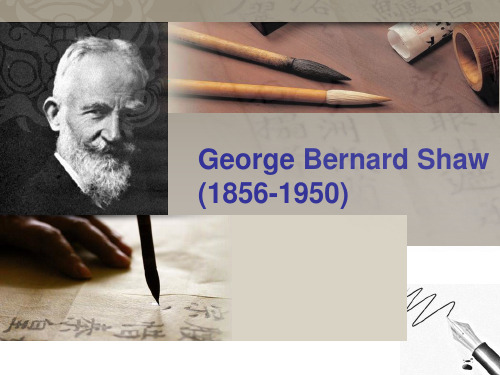
He who can does, he who cannot teaches.
——G. Bernard Shaw
Scene Ⅰ
Life
Bernard Shaw was born in Dublin, Ireland, of English parentage in 1856. He was interested in literature, music and art. He left school at 14 and started to work.
Act Ⅲ. Man and Superman
Act Ⅳ. Pygmalion
Байду номын сангаас
Act Ⅰ. Mrs. Warren’ s Profession
Vivie & Mrs. Warren
Sympathy Disgusted Break off with her Mom
Earn her own living
② on behalf of rationalist and socialist
③ “Life Force”——create superior beings
Solve
Scene Ⅲ
Points of View —— ACT Ⅰ Fabian Ideas ——ACT Ⅱ Artistic View
Fabian Society —— one of English reformist organizations
Act Ⅴ. Style
Strikingly easy, dazzlingly witty dialogue Vitality of the talk the interplay of the minds of the characters
乔治.萧伯纳

•
Art should serve social purposes by reflecting human life ,revealing social contradictions and educating the common people.
Warren’s Profession 《华伦夫人的职业》
George Bernard Shaw 乔治· 萧伯纳
George Bernard Shaw(1856-1950)
• The greatest realistic playwright since William Shahespear. • 20th century’s Paul Mauriat. • The great master of language.
《荡子》The philanderer
Plays plesesant 愉快的戏剧
《康蒂坦》Candida 《武器与人》Arms and the Men 《左右命运的人》The Man of Destiny 《你决不能讲》You Never Can Tell
《魔鬼的门徒》The Devil’s Disciple ThreePlays for Puritans 《凯撒和克里奥佩特拉》Caesar and Cleopatra 为清教徒写的戏剧 《布拉斯庞德上尉的转变》Capitain Brassbound’s Conversion
Thank you !
Comments
• Exposes the corruption and hypocrisy of the “genteel”class.
• He also explores the personal consequences of such a profession as Mrs.Warren struggles to gain the respect and love of her daughter after she dicovers the truth about her mother.
萧伯纳风趣加刻薄的经典名言
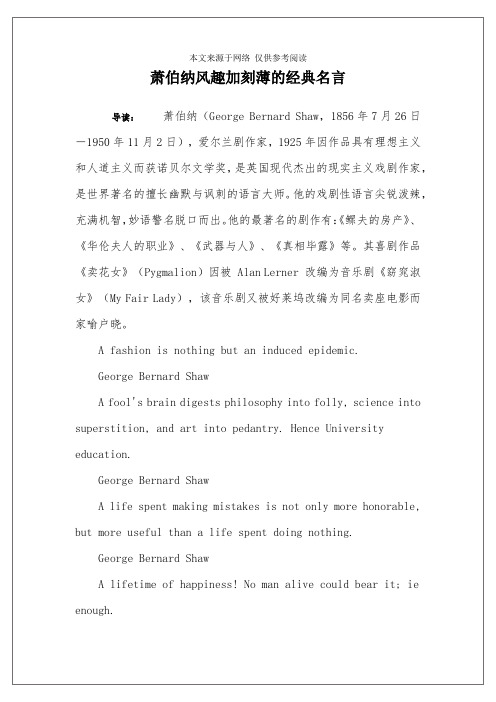
萧伯纳风趣加刻薄的经典名言
导读:萧伯纳(George Bernard Shaw,1856年7月26日-1950年11月2日),爱尔兰剧作家,1925年因作品具有理想主义和人道主义而获诺贝尔文学奖,是英国现代杰出的现实主义戏剧作家,是世界著名的擅长幽默与讽刺的语言大师。
他的戏剧性语言尖锐泼辣,充满机智,妙语警名脱口而出。
他的最著名的剧作有:《鳏夫的房产》、《华伦夫人的职业》、《武器与人》、《真相毕露》等。
其喜剧作品《卖花女》(Pygmalion)因被 Alan Lerner 改编为音乐剧《窈窕淑女》(My Fair Lady),该音乐剧又被好莱坞改编为同名卖座电影而家喻户晓。
A fashion is nothing but an induced epidemic.
George Bernard Shaw
A fool's brain digests philosophy into folly, science into superstition, and art into pedantry. Hence University education.
George Bernard Shaw
A life spent making mistakes is not only more honorable, but more useful than a life spent doing nothing.
George Bernard Shaw
A lifetime of happiness! No man alive could bear it; ie enough.
George Bernard Shaw
感谢您的阅读,如对您有帮助,可下载编辑。
卖花女

爱尔兰剧作家,文学评论家,社会主义的宣
传者。1925年因作品具有“理想主义”和 “人道主义”获诺贝尔文学
Shaw’s
Birthplace In Dubin
去尼亚加拉湖滨小镇 (Niagara-on-the-Lake), 除了在小镇的主街 Queen St上感受浓郁的 英式风情,在湖边领略 湖光水色,和去葡萄酒 庄园品酒以外,还有一 项重要活动,那便是每 年4月初至10月底在这 里举办的萧伯纳戏剧节 (Shaw Festival)。
萧伯纳出生在爱尔兰的都柏林。受到母亲的薰陶,
1892年发表了剧本《鳏夫的房屋》以后共 写了52个剧本,控诉资本主义社会的黑暗 和帝国主义侵略政策的不义,其作品常常 突出妇女在社会中的作用、自我奋斗的精 神以及对习俗的反叛。
The
person : Irish comic dramatist , literary critic, and socialist propagandist winner of the Nobel Prize for Literature in 1925.
I was born intelligent - education ruined me. --Bernard Shaw 我生下来时很聪明的——教育把我给毁了。 —萧伯纳
Since light travels faster than sound, people appear bright until you hear them speak. -- Bernard Shaw 由于光速比音速快,所以在我们听到人们开口之前,个个都显得很聪明。 —萧伯 纳 Money is not everything. There's Mastercard & Visa. --Bernard Shaw 金钱并非一切,还有信用卡呢。 —萧伯纳 The wise never marry and when they marry they become otherwise. --Bernard Shaw 明白人从不结婚,结了婚就不明白了。 —萧伯纳
George Bernard Shaw 萧伯纳的简介

BY
Contents:
1 Author 2 Author's works 3 Pygmalion 4 Style of Bernard Shaw
PART ONE
George Bernard Shaw(1856-1950)
Birithplace: Dublin, Ireland Occupation:Playwright(剧作家),Critic,
Characteristics of Bernard Shaw's plays
1.Structurally and thematically, Shaw followed the great traditions of realism [’ri:əlɪzəm].(现实主义) 2.To portray[pɔ:’treɪ](描绘)his characters, he employed contrast antithesis [æn’tɪθəsɪs](对立).His characters are the representative of ideas that alter [’ɔ:ltə(r)] (改变)during the play. 3.Much of his drama is constructed by employing inversion.(倒置) 4.The plot of his plays advanced not by action but by dialogues like comedies of manners.(风格手法)
• He contract with the poor people and came to know their miserable life. • He educated himself at the library in British Museum
萧伯纳名言名句
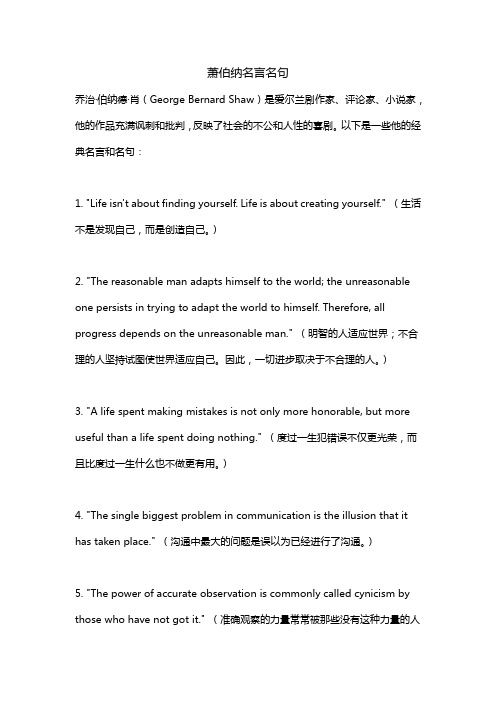
萧伯纳名言名句乔治·伯纳德·肖(George Bernard Shaw)是爱尔兰剧作家、评论家、小说家,他的作品充满讽刺和批判,反映了社会的不公和人性的喜剧。
以下是一些他的经典名言和名句:1. "Life isn't about finding yourself. Life is about creating yourself." (生活不是发现自己,而是创造自己。
)2. "The reasonable man adapts himself to the world; the unreasonable one persists in trying to adapt the world to himself. Therefore, all progress depends on the unreasonable man." (明智的人适应世界;不合理的人坚持试图使世界适应自己。
因此,一切进步取决于不合理的人。
)3. "A life spent making mistakes is not only more honorable, but more useful than a life spent doing nothing." (度过一生犯错误不仅更光荣,而且比度过一生什么也不做更有用。
)4. "The single biggest problem in communication is the illusion that it has taken place." (沟通中最大的问题是误以为已经进行了沟通。
)5. "The power of accurate observation is commonly called cynicism by those who have not got it." (准确观察的力量常常被那些没有这种力量的人称为愤世嫉俗。
George Bernard Shaw萧伯纳简介
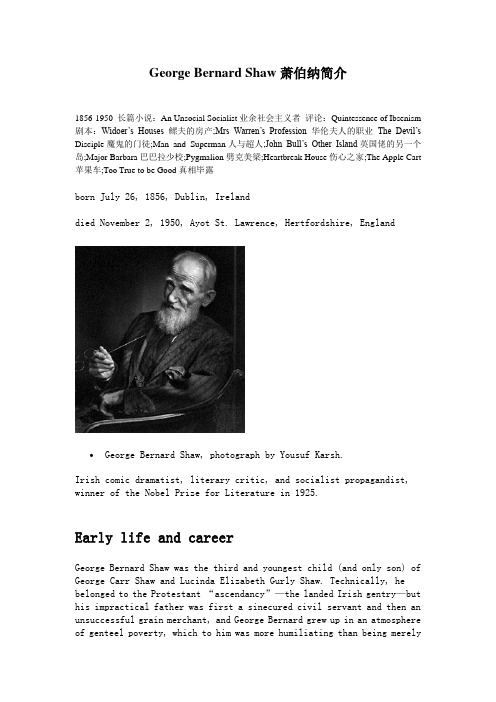
George Bernard Shaw萧伯纳简介1856-1950 长篇小说:An Unsocial Socialist业余社会主义者评论:Quintessence of Ibsenism 剧本:Widoer’s Houses鳏夫的房产;Mrs Warren’s Profession华伦夫人的职业The Devil’s Disciple魔鬼的门徒;Man and Superman人与超人;John Bull’s Other Island英国佬的另一个岛;Major Barbara巴巴拉少校;Pygmalion劈克美梁;Heartbreak House伤心之家;The Apple Cart 苹果车;Too True to be Good真相毕露born July 26, 1856, Dublin, Irelanddied November 2, 1950, Ayot St. Lawrence, Hertfordshire, EnglandGeorge Bernard Shaw, photograph by Yousuf Karsh.Irish comic dramatist, literary critic, and socialist propagandist, winner of the Nobel Prize for Literature in 1925.Early life and careerGeorge Bernard Shaw was the third and youngest child (and only son) of George Carr Shaw and Lucinda Elizabeth Gurly Shaw. Technically, he belo nged to the Protestant “ascendancy”—the landed Irish gentry—but his impractical father was first a sinecured civil servant and then an unsuccessful grain merchant, and George Bernard grew up in an atmosphere of genteel poverty, which to him was more humiliating than being merelypoor. At first tutored by a clerical uncle, Shaw basically rejected the schools he then attended, and by age 16 he was working in a land agent's office.Shaw developed a wide knowledge of music, art, and literature as a result of his mother's influence and his visits to the National Gallery of Ireland. In 1872 his mother left her husband and took her two daughters to London, following her music teacher, George John Vandeleur Lee, who from 1866 had shared households in Dublin with the Shaws. In 1876 Shaw resolved to become a writer, and he joined his mother and elder sister (the younger one having died) in London. Shaw in his 20s suffered continuous frustration and poverty. He depended upon his mother's pound a week from her husband and her earnings as a music teacher. He spent his afternoons in the British Museum reading room, writing novels and reading what he had missed at school, and his evenings in search of additional self-education in the lectures and debates that characterized contemporary middle-class London intellectual activities.His fiction failed utterly. The semiautobiographical and aptly titled Immaturity(1879; published 1930) repelled every publisher in London. His next four novels were similarly refused, as were most of the articles he submitted to the press for a decade. Shaw's initial literary work earned him less than 10 shillings a year. A fragment posthumously published as An Unfinished Novel in 1958 (but written 1887–88) was his final false start in fiction.Despite his failure as a novelist in the 1880s, Shaw found himself during this decade. He became a vegetarian, a socialist, a spellbinding orator, a polemicist, and tentatively a playwright. He became the force behind the newly founded (1884) Fabian Society, a middle-class socialist group that aimed at the transformation of English society not through revolution but through “permeation” (in Sidney Webb's term) of the country's intellectual and political life. Shaw involved himself in every aspect of its activities, most visibly as editor of one of the classics of British socialism, Fabian Essays in Socialism(1889), to which he also contributed two sections.Eventually, in 1885 the drama critic William Archer found Shaw steady journalistic work. His early journalism ranged from book reviews in the Pall Mall Gazette (1885–88) and art criticism in the World (1886–89) to brilliant musical columns in the Star(as “Corno di Bassetto”—basset horn) from 1888 to 1890 and in the World(as “G.B.S.”) from 1890 to 1894. Shaw had a good understanding of music, particularly opera, and he supplemented his knowledge with a brilliance of digression that gives many of his notices a permanent appeal. But Shaw truly began to make his markwhen he was recruited by Frank Harris to the Saturday Review as theatre critic (1895–98); in that position he used all his wit and polemical powers in a campaign to displace the artificialities and hypocrisies of the Victorian stage with a theatre of vital ideas. He also began writing his own plays.First playsWhen Shaw began writing for the English stage, its most prominent dramatists were Sir A.W. Pinero and H.A. Jones. Both men were trying to develop a modern realistic drama, but neither had the power to break away from the type of artificial plots and conventional character types expected by theatregoers. The poverty of this sort of drama had become apparent with the introduction of several of Henrik Ibsen's plays onto the London stage around 1890, when A Doll's House was played in London; his Ghosts followed in 1891, and the possibility of a new freedom and seriousness on the English stage was introduced. Shaw, who was about to publish The Quintessence of Ibsenism (1891), rapidly refurbished an abortive comedy, Widowers' Houses, as a play recogni zably “Ibsenite” in tone, making it turn on the notorious scandal of slum landlordism in London. The result (performed 1892) flouted the threadbare romantic conventions that were still being exploited even by the most daring new playwrights. In the play a well-intentioned young Englishman falls in love and then discovers that his prospective father-in-law's fortune and his own private income derive from exploitation of the poor. Potentially this is a tragic situation, but Shaw seems to have been always determined to avoid tragedy. The unamiable lovers do not attract sympathy; it is the social evil and not the romantic predicament on which attention is concentrated, and the action is kept well within the key of ironic comedy.The same dramatic predispositions control Mrs. Warren's Profession, written in 1893 but not performed until 1902 because the lord chamberlain, the censor of plays, refused it a license. Its subject is organized prostitution, and its action turns on the discovery by a well-educated young w oman that her mother has graduated through the “profession” to become a part-proprietor of brothels throughout Europe. Again, the economic determinants of the situation are emphasized, and the subject is treated remorselessly and without the titillation of fashionable comedies about “fallen women.” As with many of Shaw's works, the play is, within limits, a drama of ideas, but the vehicle by which these are presented is essentially one of high comedy.Shaw called these first plays “unpleasant,” because “the ir dramatic power is used to force the spectator to face unpleasant facts.” He followed them with four “pleasant” plays in an effort to find the producers and audiences that his mordant comedies had offended. Both groups of plays were revised and published in Plays Pleasant and Unpleasant (1898). The first of the second group, Arms and the Man (performed 1894), has a Balkan setting and makes lighthearted, though sometimes mordant, fun of romantic falsifications of both love and warfare. The second, Candida (performed 1897), was important for English theatrical history, for its successful production at the Royal Court Theatre in 1904 encouraged Harley Granville-Barker and J.E. Vedrenne to form a partnership that resulted in a series of brilliant productions there. The play represents its heroine as forced to choose between her clerical husband—a worthy but obtuse Christian socialist—and a young poet who has fallen wildly in love with her. She chooses herconfident-seeming husband because she discerns that he is actually the weaker. The poet is immature and hysterical but, as an artist, has a capacity to renounce personal happiness in the interest of some large creative purpose. This is a significant theme for Shaw; it leads on to that of the conflict between man as spiritual creator and woman as guardian of the biological continuity of the human race that is basic to Man and Superman. In Candida such speculative issues are only lightly touched on, and this is true also of You Never Can Tell (performed 1899), in which the hero and heroine, who believe themselves to be respectively an accomplished amorist and an utterly rational and emancipated woman, find themselves in the grip of a vital force that takes little account of these notions.The strain of writing these plays, while his critical and political work went on unabated, so sapped Shaw's strength that a minor illness became a major one. In 1898, during the process of recuperation, he married his unofficial nurse, Charlotte Payne-Townshend, an Irish heiress and friend of Beatrice and Sidney Webb. The apparently celibate marriage lasted all their lives, Shaw satisfying his emotional needs in paper-passion correspondences with Ellen Terry, Mrs. Patrick Campbell, and others.Shaw's next collection of plays, Three Plays for Puritans (1901), continued what became the traditional Shavian preface—an introductory essay in an electric prose style dealing as much with the themes suggested by the plays as the plays themselves. The Devil's Disciple(performed 1897) is a play set in New Hampshire during the American Revolution and is an inversion of traditional melodrama. Caesar and Cleopatra(performed 1901) is Shaw's first great play. In the play Cleopatra is a spoiled and vicious 16-year-old child rather than the 38-year-old temptress of Shakespeare'sAntony and Cleopatra. The play depicts Caesar as a lonely and austere man who is as much a philosopher as he is a soldier. The play's outstanding success rests upon its treatment of Caesar as a credible study in magnanimity an d “original morality” rather than as a superhuman hero on a stage pedestal. The third play, Captain Brassbound's Conversion (performed 1900), is a sermon against various kinds of folly masquerading as duty and justice.International importanceIn Man and Superman (performed 1905) Shaw expounded his philosophy that humanity is the latest stage in a purposeful and eternal evolutionary movement of the “life force” toward ever-higher life forms. The play's hero, Jack Tanner, is bent on pursuing his own spiritual development in accordance with this philosophy as he flees the determined marital pursuit of the heroine, Ann Whitefield. In the end Jack ruefully allows himself to be captured in marriage by Ann upon recognizing that she herself is a powerful instrume nt of the “life force,” since the continuation and thus the destiny of the human race lies ultimately in her and other women's reproductive capacity. The play's nonrealistic third act, the “Don Juan in Hell” dream scene, is spoken theatre at its most opera tic and is often performed independently as a separate piece.Shaw had already become established as a major playwright on the Continent by the performance of his plays there, but, curiously, his reputation lagged in England. It was only with the production of John Bull's Other Island(performed 1904) in London, with a special performance for Edward VII, that Shaw's stage reputation was belatedly made in England.Shaw continued, through high comedy, to explore religious consciousness and to point out society's complicity in its own evils. In Major Barbara (performed 1905), Shaw has his heroine, a major in the Salvation Army, discover that her estranged father, a munitions manufacturer, may be a dealer in death but that his principles and practice, however unorthodox, are religious in the highest sense, while those of the Salvation Army require the hypocrisies of often-false public confession and the donations of the distillers and the armourers against which it inveighs. In The Doctor's Dilemma(performed 1906), Shaw produced a satire upon the medical profession (representing the self-protection of professions in general) and upon both the artistic temperament and the public's inability to separate it from the artist's achievement. In Androcles and the Lion (performed 1912), Shaw dealt with true and false religious exaltation ina philosophical play about early Christianity. Its central theme, examined through a group of early Christians condemned to the arena, is that one must have something worth dying for—an end outside oneself—in order to make life worth living.Possibly Shaw's comedic masterpiece, and certainly his funniest and most popular play, is Pygmalion (performed 1913). It was claimed by Shaw to be a didactic drama about phonetics, and its antiheroic hero, Henry Higgins, is a phonetician, but the play is a humane comedy about love and the English class system. The play is about the training Higgins gives to a Cockney flower girl to enable her to pass as a lady and is also about the repercussions of the experiment's success. The scene in which Eliza Doolittle appears in high society when she has acquired a correct accent but no notion of polite conversation is one of the funniest in English drama. Pygmalion has been both filmed (1938), winning an Academy Award for Shaw for his screenplay, and adapted into an immensely popular musical, My Fair Lady (1956; motion-picture version, 1964).Works after World War IWorld War I was a watershed for Shaw. At first he ceased writing plays, publishing instead a co ntroversial pamphlet, “Common Sense About the War,” which called Great Britain and its Allies equally culpable with the Germans and argued for negotiation and peace. His antiwar speeches made him notorious and the target of much criticism. In Heartbreak House (performed 1920), Shaw exposed, in a country-house setting on the eve of war, the spiritual bankruptcy of the generation responsible for the war's bloodshed. Attempting to keep from falling into “the bottomless pit of an utterly discouraging pessimism,” Shaw wrote five linked plays under the collective title Back to Methuselah (1922). They expound his philosophy of creative evolution in an extended dramatic parable that progresses through time from the Garden of Eden to AD 31,920.The canonization of Joan of Arc in 1920 reawakened within Shaw ideas for a chronicle play about her. In the resulting masterpiece, Saint Joan (performed 1923), the Maid is treated not only as a Catholic saint and martyr but as a combination of practical mystic, heretical saint, and inspired genius. Joan, as the superior being “crushed between those mighty forces, the Church and the Law,” is the personification of the tragic heroine; her death embodies the paradox that humankind fears—and often kills—its saints and heroes and will go on doing so until the very higher moral qualities it fears become the general condition of manthrough a process of evolutionary change. Acclaim for Saint Joan led to the awarding of the 1925 Nobel Prize for Literature to Shaw (he refused the award).In his later plays Shaw intensified his explorations into tragicomic and nonrealistic symbolism. For the next five years, he wrote nothing for the theatre but worked on his collected edition of 1930–38 and the encyclopaedic political tract “The Intelligent Woman's Guide to Socialism and Capitalism” (1928). Then he produced The Apple Cart (performed 1929), a futuristic high comedy that emphasized Shaw's inner conflicts between his lifetime of radical politics and his essentially conservative mistrust of the common man's ability to govern himself. Shaw's later, minor plays included Too True to Be Good(performed 1932), On The Rocks (performed 1933), The Simpleton of the Unexpected Isles (performed 1935), Geneva (performed 1938), and In Good King Charles's Golden Days(1939). After a wartime hiatus, Shaw, then in his 90s, produced several more plays, including Farfetched Fables(performed 1950), Shakes Versus Shav (performed 1949), and Why She Would Not (1956), which is a fantasy with only flashes of the earlier Shaw.Impudent, irreverent, and always a showman, Shaw used his buoyant wit to keep himself in the public eye to the end of his 94 years; his wiry figure, bristling beard, and dandyish cane were as well-known throughout the world as his plays. When his wife, Charlotte, died of a lingering illness in 1943, in the midst of World War II, Shaw, frail and feeling the effects of wartime privations, made permanent his retreat from his London apartment to his country home at Ayot St. Lawrence, a Hertfordshire village in which he had lived since 1906. He died there in 1950.George Bernard Shaw was not merely the best comic dramatist of his time but also one of the most significant playwrights in the English language since the 17th century. Some of his greatest works for the stage—Caesar and Cleopatra, the “Don Juan in Hell” episode of Man and Superman, Major Barbara, Heartbreak House, and Saint Joan—have a high seriousness and prose beauty that were unmatched by his stage contemporaries. His development of a drama of moral passion and of intellectual conflict and debate, his revivifying the comedy of manners, his ventures into symbolic farce and into a theatre of disbelief helped shape the theatre of his time and after. A visionary and mystic whose philosophy of moral passion permeates his plays, Shaw was also the most trenchant pamphleteer since Swift; the most readable music critic in English; the best theatre critic of his generation; a prodigious lecturer and essayist on politics, economics, and sociological subjects; and one of the most prolific letter writers in literature. By bringing a bold critical intelligence to hismany other areas of interest, he helped mold the political, economic, and sociological thought of three generations.Stanley WeintraubJohn I.M. Stewart Ed.Additional ReadingWorks that are primarily biography include Archibald Henderson, George Bernard Shaw, Man of the Century (1956, reissued in 2 vol., 1972); Frank Harris, Bernard Shaw (1931); Hesketh Pearson, Bernard Shaw (1942, reissued 1987; also published as G.B.S., 1942, reissued 1952, and as George Bernard Shaw, 1963); William Irvine, The Universe of G.B.S. (1949); St. John Greer Ervine, Bernard Shaw (1956); Allan Chappelow (ed.), Shaw the Villager and Human Being (1961); B.C. Rosset, Shaw of Dublin: The Formative Years (1964); J. Percy Smith, The Unrepentant Pilgrim (1965), a study of Shaw's twenties and thirties; Margot Peters, Bernard Shaw and the Actresses (1980); Arnold Silver, Bernard Shaw: The Darker Side (1982), a psychological study; and Michael Holroyd, Bernard Shaw, 4 vol. (1988–92). Early works of criticism include Henry L. Mencken, George Bernard Shaw: His Plays (1905, reprinted 1977); and G.K. Chesterton, George Bernard Shaw, new ed. (1935, reissued 1961). T.F. Evans (ed.), Shaw: The Critical Heritage (1976), collects contemporary criticism,1892–1951. Later criticism includes E. Strauss, Bernard Shaw: Art and Socialism (1942, reprinted 1978); Eric Bentley, Bernard Shaw (1947, reissued 1976); Alick West, George Bernard Shaw: “A Good Man Fallen Among Fabians” (1950); Arthur H. Nethercot, Men and Supermen, 2nd ed. (1966), an analysis of Shaw's characters; Julian B. Kaye, Bernard Shaw and the Nineteenth-Century Tradition (1958); Martin Meisel, Shaw and the Nineteenth-Century Theater (1963, reprinted 1984); Bernard F. Dukore, Bernard Shaw, Playwright: Aspects of Shavian Drama (1973); Eldon C. Hill, George Bernard Shaw (1978), an introductory study; Michael Holroyd (ed.), The Genius of Shaw: A Symposium (1979); Stanley Weintraub, The Unexpected Shaw: Biographical Approaches to G.B.S. and His Work (1982); Warren Sylvester Smith, Bishop of Everywhere: Bernard Shaw and the Life Force (1982), exploring aspects of Shaw's religiosity; A.M. Gibbs, The Art and Mind of Shaw (1983); and Nicholas Grene, Bernard Shaw, a Critical View (1984). Current criticism may be found in the journal Shaw (annual).。
戏剧的概念萧伯纳

戏剧的概念萧伯纳
戏剧是一种艺术形式,通常是在舞台上表演的一系列故事或情境的呈现。
萧伯纳(George Bernard Shaw)是一位爱尔兰剧作家和评论家,被认为是戏剧史上最重要的人物之一。
萧伯纳的戏剧作品具有深刻的思想性和社会意义,常常通过喜剧的手法来揭示社会问题和阶级冲突。
他的作品主题涵盖了女权主义、社会主义、战争和人类道德等各个方面。
萧伯纳的剧作着重于对话,他经常通过角色之间的辩论来探讨不同的观点和思想。
他的作品中的角色常常是富有智慧和洞察力的人物,通过他们的对话和行动,揭示出社会的不公和现象的荒谬。
萧伯纳的代表作包括《理智与情感》、《五品花旦》和《背后说坏话》等。
他的戏剧作品不仅具有艺术价值,也有很高的思想性和社会关怀,深受观众和评论家的喜爱与赞赏。
萧伯纳-PPT文档资料
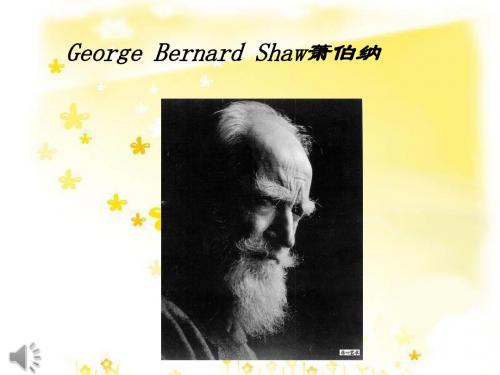
• 萧伯纳(George Bernard Shaw,1856—1950)爱 尔兰剧作家,1925年因 为作品具有理想主义和 人道主义而获诺贝尔文 学奖,是英国现代杰出 的现实主义戏剧作家, 是世界著名的擅长幽默 与讽刺的语言大师。
• 萧伯纳的一生,是和社会主义运动发生密切关 系的一生,他认真研读过《资本论》,公开声 言他“是一个普通的无产者”,“一个社会主 义者”。他主张艺术应当反映迫切的社会问题, 反对“为艺术而艺术”。其思想深受德国哲学 家叔本华及尼采的影响,而且又曾读过马克思 的著作,不过他却主张用渐进的方法改变资本
度假地第一次偷情 萧伯纳老少恋首度曝光
• 据英国《泰晤士报》报道,关于爱尔兰裔著名剧作家萧 伯纳有一个流传很广的笑话,说是美国现代舞创始人邓 肯曾向萧伯纳写信求爱,希望与萧伯纳生下一子,好让 他同时拥有邓肯的美貌和萧伯纳的智慧,没想到萧伯纳 回信称:“如果孩子的容貌如我,大脑像你怎么办?” • 这当然是一个无据可查的笑谈,然而不为人知的是,现 实生活中的萧伯纳的确有一个身为女演员的“美国情 人”,这名20多岁的年轻美女还差点为他生下一子。 • 这段“忘年之恋”是萧伯纳生平保守最严格的秘密,直 到他去世54年后的今天,他“美国情人”的儿子、现年 85岁的美国前记者彼得· 汤普金斯才终于决定向世人首 次披露萧伯纳生平的这一“绝对隐私”。
我活多久,这种事情迟早总会 发生的。”
• 萧伯纳的文学始于小说创作,但突出的 成就是戏剧,他一共创作了52部剧本
• 主要作品
• • • • • • ●《卡希尔· 拜伦的职业》(Cashel Byron's Profession) 电影《窈窕淑女》(奥黛丽· 赫本主演) ●《鳏夫的房产》(Widowers' Houses) ●《圣女贞德》(Saint Joan) ●历史剧 《卖花女》(Pygmalion) (1964年改编成电影《窈窕淑女》,当年获奥斯卡最佳影片、最佳导演、最佳改 编音乐等八座小金人。) ●《魔鬼的门徒》(The Devil's Disciple) ●《人与超人》(Man and Superman) ●《伤心之家》(Heartbreak House) ●《华伦夫人的职业》(Mrs Warren's Profession) ●《巴巴拉少校》(Major Barbara) ●《苹果车》(The Apple Cart) ●《医生的两难选择》(The Doctor's Dilemma) ●《长生》或《千岁人》(Back to Methuselah) ●《凯撒和克娄巴特拉》(Caesar and Cleopatra)
萧伯纳
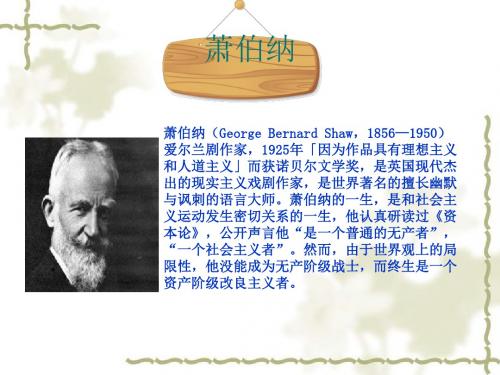
●《鳏夫的房产》(Widowers' Houses)
●《圣女贞德》(Saint Joan)
●历史剧 《卖花女》(Pygmalion)
(1964年改编成电影《窈窕淑女》,当年获奥斯卡最佳影片、最佳导 演、最 佳改编音乐等八座小金人。)
●《魔鬼的门徒》(The Devil's Diቤተ መጻሕፍቲ ባይዱciple)
●《人与超人》(Man and Superman)
●《伤心之家》(Heartbreak House)
●《华伦夫人的职业》(Mrs Warren's Profession)
●《巴巴拉少校》(Major Barbara)
●《苹果车》(The Apple Cart)
●《医生的两难选择》(The Doctor's Dilemma)
戏剧特点
萧伯纳的戏剧最突出的特点是紧密结合现实政治斗争,敢于 触及资本主义社会最本质的问题,把剥削阶级的丑恶嘴脸暴 露在公众面前。在艺术手法上,他善于通过人物对话和思想 感情交锋来表现性格冲突和主思想。萧伯纳的戏剧性语言尖 锐泼辣,充满机智,妙语警名脱口而出。他的最著名的剧作 有:《鳏夫的房产》、《华伦夫人的职业》、《武器与人》、
《真相毕露》等。其喜剧作品《卖花女》(Pygmalion)因 被 Alan Lerner 改编为音乐剧《窈窕淑女》(My Fair Lady),该音乐剧又被好莱坞改编为同名卖座电影而家喻户
晓。 三十年代初,萧伯纳访问苏联和中国,与高尔基,鲁 迅结下诚挚友谊。
主要作品
●《卡希尔·拜伦的职业》(Cashel Byron's Profession )
萧伯纳的故事

萧伯纳的故事爱尔兰剧作家萧伯纳(George Bernard Shaw)是20世纪最伟大的戏剧家之一,他的作品《皮格马利翁》、《凤凰男》等在世界戏剧史上留下了不朽的篇章。
他的一生跌宕起伏,充满了传奇色彩。
萧伯纳出生于一个贫穷的爱尔兰家庭,他的童年并不幸福。
父亲是一位小学教师,家境拮据。
但正是在这样的环境下,萧伯纳磨练出了坚韧不拔的性格和不屈不挠的毅力。
他从小就展现出非凡的才华,擅长文学和音乐,尤其对戏剧产生了浓厚的兴趣。
年轻的萧伯纳离开了家乡,前往伦敦追寻自己的梦想。
在伦敦,他经历了一段艰苦的时期,为了生计,他做过文书、校对、评论和写作等工作。
但无论做什么工作,他都不忘对戏剧的执着追求。
他在自学的过程中,广泛涉猎了文学、哲学、经济学等各个领域的知识,这些知识的积累为他后来的创作打下了坚实的基础。
萧伯纳的第一部戏剧作品是《皮格马利翁》,这部作品一经问世,便引起了轰动。
它不仅在英国引起了巨大的反响,也在国际上获得了极高的评价。
《皮格马利翁》以其深刻的思想和优美的语言征服了观众,使萧伯纳一举成名。
此后,他又相继创作了《凤凰男》、《圣女贞德》等一系列杰出的作品,为世人所津津乐道。
除了戏剧创作,萧伯纳还是一位杰出的文论家和社会活动家。
他的《英国各阶级的特征》、《社会主义者的信仰》等著作,揭露了当时社会的种种弊病,引起了社会的广泛关注。
他积极参与了社会改革运动,为废除奴隶制度、争取妇女权利等事业倾注了心血。
萧伯纳一生坚持着自己的理想和信念,他的作品充满了对社会现实的批判和对人性的关怀。
他的作品不仅具有很高的艺术价值,更蕴含着深刻的思想内涵,对当代社会仍具有重要的启示意义。
总的来说,萧伯纳是一位伟大的戏剧家,他的一生充满了传奇色彩。
他的作品不仅在戏剧史上留下了不朽的篇章,也为后人树立了崇高的精神典范。
他的故事激励着我们,让我们更加坚定地追求自己的梦想,为社会的进步贡献自己的力量。
George Bernard Shaw简介
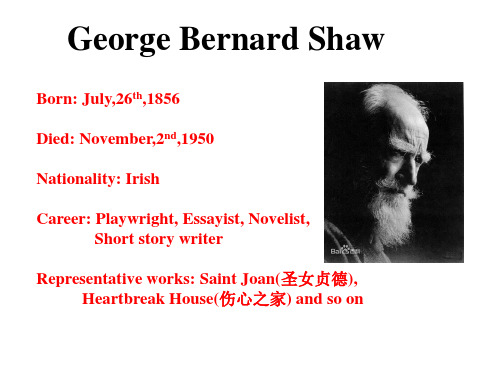
• style • (1)Shaw is a critical realist writer. His plays bitterly criticize and attack English bourgeois society. • (2)His plays deal with contemporary social problems. He portrays his situations frankly and honestly, intending to shock his audiences with a new view of society. • (3)He is a humorist and manages to produce amusing and laughable situations.
• 3.The inversion 倒置of the situation : Much of Shavian 萧伯纳的 drama is constructed around the inversion of a conventional theatrical situation. The inversion is an integral part of an interpretation of life .Inversion is also used in character portrayal to achieve comic effects .
Scene Ⅲ
Points of View —— ACT Ⅰ Fabian Ideas ——ACT Ⅱ Artistic View
Realistic playwright
Against —— “Art for art’ s sake” Condemn —— the “well-made” but cheap, hollow plays Maintain —— Art should serve social purposes by reflecting human life, revealing social contradictions and educating the common people.
关于萧伯纳的幽默故事

关于萧伯纳的幽默故事萧伯纳(George Bernard Shaw)是英国著名剧作家、评论家和社会活动家,他以其尖锐幽默的文字风格而闻名于世。
在他的作品中,常常通过幽默的手法来批判社会不公和现实问题。
下面将为您介绍几个萧伯纳的幽默故事。
故事一:《自由女神与女佣的对话》在这个故事中,萧伯纳以幽默的方式探讨了社会阶级和权力的问题。
故事发生在纽约自由女神像上。
自由女神和一个女佣在对话,女佣问自由女神:“你为什么站在那里?”自由女神回答:“我在这里代表自由和正义。
”女佣笑了起来,“噢,那么你是一个女佣吗?”自由女神困惑地问:“为什么你这么说?”女佣耸了耸肩膀:“因为你站在那么高的地方,就好像在挖掘可能会破坏地盘的煤矿一样。
”故事二:《桫椤树下的约会》这个故事讲述了一个年轻女子与她的婚姻介绍人在一棵桫椤树下的对话。
女子向介绍人抱怨说自己的丈夫很沉闷,没有幽默感。
介绍人回应道:“我的天!您想要什么样的丈夫呢?”女子发送遐想,回答道:“我希望他毫无幽默感,这样我可以独享所有的笑声。
”故事三:《伊凡诺夫的金子》这个故事揭示了人们贪婪和追求金钱的一面。
伊凡诺夫是个酒保,他梦见了藏有金子的地方。
醒来后,他迫不及待地去找到金子。
他花费了整个下午,拼命挖掘地面,在他疲惫不堪时,终于发现了一颗巨大的土豆。
他欣喜若狂地将土豆塞入口袋,并说:“哇!我找到宝藏了!”然后转身回家,满怀欣喜地准备煮熟这颗“金子”。
故事四:《权力的戏剧》这个故事讽刺了政治家和权力的虚伪。
在一个权力游戏盛行的国度,政治家常常做一些虚伪的事情来迎合选民。
每当政治家上任宣誓时,总有一个小人物在一旁大声吹起口哨。
政治家宣誓后,这个小人物会立即喝掉一杯加糖的水,并建议政治家也喝一杯。
政治家虚情假意地接过水杯,喝下一口,然后说:“看!我早就知道这杯水里有毒!”这些幽默故事展示了萧伯纳对人性和社会问题的独特见解,他以幽默的方式揭示了社会弊端和人们的虚伪之处。
通过这些故事,我们可以思考和反思当代社会中的一些现象,以及我们自己是否也可以运用幽默的力量来照亮生活中的困境。
萧伯纳的故事

萧伯纳的故事萧伯纳(George Bernard Shaw)是一位著名的爱尔兰剧作家和文学家,被誉为20世纪英国文学的重要人物之一。
萧伯纳于1856年出生在都柏林的一个中产阶级家庭,年轻时曾是一位音乐评论员和剧院评论员。
他的第一部剧作《胡安——你来自哪里?》于1893年发表,引起了轰动。
此后他又相继出版了许多重要的剧作,如《成为最高统治者》、《圣女贞德》和《皆大欢喜》等。
萧伯纳的剧作大多涵盖社会问题和政治问题,以及对人性和道德的深刻探讨,深受广大读者和观众的喜爱。
萧伯纳不仅是一位出色的剧作家,还是一位积极的社会活动家和政治家。
他关注贫穷、教育和女权等社会问题,在政治上则支持社会主义和左翼思想,曾经加入英国社会党。
他还借助自己的影响力,在二战期间募集了大量的捐款,用于支援战争的难民和战斗的士兵。
萧伯纳的一生充满了传奇色彩,他是一位充满激情和智慧的人。
他不仅是一位伟大的文学家,更是一个伟大的人格。
他的故事激励着人们追求真理和正义,为了自己的信仰和理想而不断奋斗。
在他的作品中,萧伯纳通常会带着讽刺和挖苦的口吻揭示社会的黑暗面和人性的弱点,打破现实的假象,勇敢地挑战社会权力和传统观念。
他的剧作常常充满了幽默和反讽,挑战了观众对生活的认知和理解。
萧伯纳早年积极参与文学界和剧院界的工作,他在评论古典音乐方面颇有造诣,曾经写过许多音乐评论,而这也是他日后创作音乐剧的基础。
他的剧作也被广泛地演出,并得到了许多的赞誉和奖项。
他所创作的剧作一直受到读者和观众的热爱和追捧,被视为现代戏剧史上的经典之作。
在萧伯纳的后期,他也参与了政治和社会的活动,曾经担任伦敦市议会的成员和英国社会党的领导人。
他一直致力于改善社会的不公和不平等,为穷苦人民和弱势群体的权益而奋斗。
他的思想理念深深地影响了20世纪的英国文化和社会。
萧伯纳虽已离开人世多年,但他的作品和思想依然在人们心中生生不息。
他是英国文学史上的巨人,也是世界文学史上的瑰宝,他的故事将一直流传下去,激励着人们追求美好和幸福的生活。
George Bernard Shaw萧伯纳简介

Shaw and his drama
• In th e n in e tie s ,S h a w tu rn to th e th e a tr e .H e w a s th e c re a to r o f a n e w p u b lic is t d ra m a ,h is ro le in th e d e v e lo p m e n to f d ra m a tu rg y is v e r y g re a t .H e w a s a g a in s t "a r t fo r a rt 's s a k e (为艺术而艺术)",h e w ro te ,"fo r a rt 's s a k e I w ill n o t fa c e th e to il o f w rittin g a s e n te n c e (为 了艺术我不会忍受写下一个句子的辛苦)".H e a ls o u s e d th e s ta g e to c r itis iz e th e e v ils o f c a p ita lis m .T h is h e a c h ie v e d n o t s o m u c h b y th e s tr u c tu r e s o f p lo ts in h is p la y s ,a s b y th e b r ilia n t d ia lo g u e s b e tw e e n th e c a ra c te rs .H is e x p o s u re o f th e c a p ita lis t s o c ie ty is v e r y s ig n ific a n t a n d it p a c e s S h a w a m o n g th e m o s t im p o rta n t re p re s e n ta tiv e s o f c r itic a l re a lis m in m o d e r n E n g lis h lite r a tu r e .
萧伯纳的故事

背景萧伯纳(George Bernard Shaw,1856年7月26日~1950年11月2日),直译为乔治·伯纳·萧,爱尔兰剧作家,1925年「因为作品具有理想主义和人道主义」而获诺贝尔文学奖,是英国现代杰出的现实主义戏剧作家,是世界著名的擅长幽默与讽刺的语言大师。
萧伯纳的一生,是和社会主义运动发生密切关系的一生,他认真研读过《资本论》,公开声言他“是一个普通的无产者”,“一个社会主义者”。
然而,由于世界观上的局限性,他没能成为无产阶级战士,而终生是一个资产阶级改良主义者。
萧伯纳1856年7月26日,出生于爱尔兰的首都都伯林(注释:他出生的时候爱尔兰还是英国的一部分,故有些资料分类他的国籍为英国)的一个小公务员家里。
他的父亲是个没落贵族,母亲出身于高贵的乡绅世家,从小受过严格的上等教育。
著名作家萧伯纳的童年、青年时代是很不幸的。
他的父亲不仅形象极丑,而且是个谁都不喜欢的懒惰者,多半是整天醉醺醺的,老婆孩子的事情一概不管。
萧伯纳年幼时,研究音乐理论的万达里尔李与他们合租了一幢房子。
受这位研究音乐的邻居影响,萧伯纳迷恋上了音乐,13岁时,他就能用口哨吹出许多优秀歌剧的片段,由于家里太穷,15岁的萧伯纳不得不辍学。
为了维持生活,他进入都柏林的汤森地产公司当学徒。
1876年,他的父母离婚。
萧伯纳告别了年迈的父亲,离开了贫困的故土爱尔兰,随母亲来到伦敦。
年轻的萧伯纳没有工作,靠母亲微薄的薪水维持生活,十分渴望找到一份称心的职业,他先在爱迪生电话公司外务部找到一份差事,可是不久这家公司倒闭了,别人给他介绍到《大黄蜂》报撰写音乐评论,可不久这份报刊也停刊了。
万般无奈的萧伯纳想以写作谋生,但是他并不顺利,他接着写了5部长篇小说,全部被60家出版社拒绝,这令他更加沮丧。
在长达九年的时间里所得的稿酬不过6英镑,其中5英镑还是代写卖药广告的报酬。
1876~1898年在伦敦从事新闻工作,在《明星报》、《星期六评论》上写了很多关于音乐和戏剧的评论文章。
萧伯纳简介(中英文)
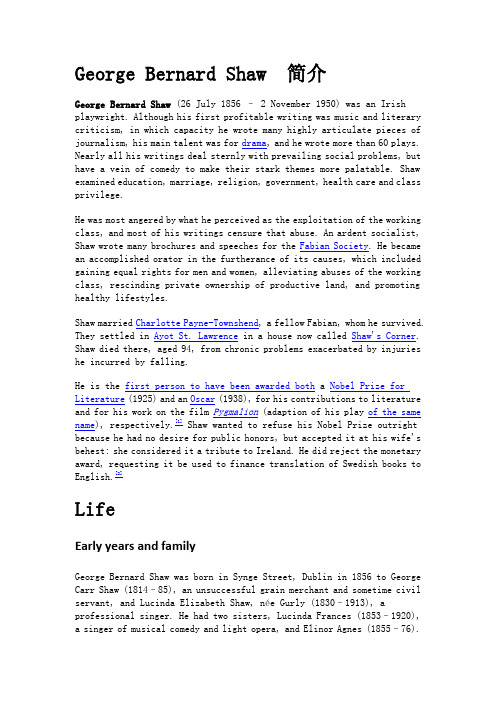
George Bernard Shaw 简介George Bernard Shaw (26 July 1856 – 2 November 1950) was an Irish playwright. Although his first profitable writing was music and literary criticism, in which capacity he wrote many highly articulate pieces of journalism, his main talent was for drama, and he wrote more than 60 plays. Nearly all his writings deal sternly with prevailing social problems, but have a vein of comedy to make their stark themes more palatable. Shaw examined education, marriage, religion, government, health care and class privilege.He was most angered by what he perceived as the exploitation of the working class, and most of his writings censure that abuse. An ardent socialist, Shaw wrote many brochures and speeches for the Fabian Society. He became an accomplished orator in the furtherance of its causes, which included gaining equal rights for men and women, alleviating abuses of the working class, rescinding private ownership of productive land, and promoting healthy lifestyles.Shaw married Charlotte Payne-Townshend, a fellow Fabian, whom he survived. They settled in Ayot St. Lawrence in a house now called Shaw's Corner. Shaw died there, aged 94, from chronic problems exacerbated by injuries he incurred by falling.He is the first person to have been awarded both a Nobel Prize for Literature(1925) and an Oscar(1938), for his contributions to literature and for his work on the film Pygmalion (adaption of his play of the same name), respectively.[1] Shaw wanted to refuse his Nobel Prize outright because he had no desire for public honors, but accepted it at his wife's behest: she considered it a tribute to Ireland. He did reject the monetary award, requesting it be used to finance translation of Swedish books to English.[2]LifeEarly years and familyGeorge Bernard Shaw was born in Synge Street, Dublin in 1856 to George Carr Shaw (1814–85), an unsuccessful grain merchant and sometime civil servant, and Lucinda Elizabeth Shaw, née Gurly (1830–1913), a professional singer. He had two sisters, Lucinda Frances (1853–1920), a singer of musical comedy and light opera, and Elinor Agnes (1855–76).[edit] EducationShaw briefly attended the Wesleyan Connexional School, a grammar school operated by the Methodist New Connexion, before moving to a private school near Dalkey and then transferring to Dublin's Central Model School. He ended his formal education at the Dublin English Scientific and Commercial Day School. He harbored a lifelong animosity toward schools and teachers, saying: "Schools and schoolmasters, as we have them today, are not popular as places of education and teachers, but rather prisons and turnkeys in which children are kept to prevent them disturbing and chaperoning their parents".[3]In the astringent prologue to Cashel Byron's Profession young Byron's educational experience is a fictionalized description of Shaw's own schooldays. Later, he painstakingly detailed the reasons for his aversion to formal education in his Treatise on Parents and Children.[4] In brief, he considered the standardized curricula useless, deadening to the spirit and stifling to the intellect. He particularly deplored the use of corporal punishment, which was prevalent in his time.When his mother left home and followed her voice teacher, George Vandeleur Lee, to London, Shaw was almost sixteen years old. His sisters accompanied their mother[5] but Shaw remained in Dublin with his father, first as a reluctant pupil, then as a clerk in an estate office. He worked efficiently, albeit discontentedly, for several years.[6] In 1876, Shaw joined his mother's London household. She, Vandeleur Lee, and his sister Lucy, provided him with a pound a week while he frequented public libraries and the British Museum reading room where he studied earnestly and began writing novels. He earned his allowance by ghostwriting Vandeleur Lee's music column,[7][8] which appeared in the London Hornet. His novels were rejected, however, so his literary earnings remained negligible until 1885, when he became self-supporting as a critic of the arts.[edit] Personal life and political activismThe front of Shaw's Corner as it stands todayInfluenced by his reading, he became a dedicated Socialist and a charter member of the Fabian Society,[9] a middle class organization established in 1884 to promote the gradual spread of socialism by peaceful means.[6] In the course of his political activities he met Charlotte Payne-Townshend, an Irish heiress and fellow Fabian; they married in 1898. In 1906 the Shaws moved into a house, now called Shaw's Corner, in Ayot St. Lawrence, a small village in Hertfordshire; it was to be their home for the remainder of their lives, although they also maintained a residence at 29 Fitzroy Square in London.Shaw's plays were first performed in the 1890s. By the end of the decade he was an established playwright. He wrote sixty-three plays and his output as novelist, critic, pamphleteer, essayist and private correspondent was prodigious. He is known to have written more than 250,000 letters.[10]Along with Fabian Society members Sidney and Beatrice Webb and Graham Wallas, Shaw founded the London School of Economics and Political Science in 1895 with funding provided by private philanthropy, including a bequest of £20,000 from Henry Hunt Hutchinson to the Fabian Society. One of the libraries at the LSE is named in Shaw's honor; it contains collections of his papers and photographs.[11][edit] Final yearsDuring his latter years, Shaw enjoyed attending to the grounds at Shaw's Corner. He died at the age of 94, of renal failure precipitated by injuries incurred by falling while pruning a tree.[12] His ashes, mixed with those of his wife, Charlotte Payne-Townshend, were scattered along footpaths and around the statue of Saint Joan in their garden.[13][edit] Career[edit] WritingsThe International Shaw Society provides a detailed chronological listing of Shaw's writings.[14]See also George Bernard Shaw, Unity Theatre.[15]View Shaw's Works for listings of his novels and plays, with links to their electronic texts, if those exist.[edit] CriticismShaw became a critic of the arts when, sponsored by William Archer, he joined the reviewing staff of the Pall Mall Gazette in 1885.[16] There he wrote under the pseudonym "Corno di Bassetto" ("basset horn")—chosen because it sounded European and nobody knew what a corno di bassetto was. In a miscellany of other periodicals, including Dramatic Review (1885–86), Our Corner (1885–86), and the Pall Mall Gazette (1885–88) his byline was "GBS".[17] From 1895 to 1898, Shaw was the drama critic for Frank Harris' Saturday Review, in which position he campaigned brilliantly to displace the artificialities and hypocrisies of the Victorian stage with a theater of actuality and thought. His earnings as a critic made him self-supporting as an author and his articles for the Saturday Review made his name well-known.He had a very high regard for both Irish stage actor Barry Sullivan's and Johnston Forbes-Robertson's Hamlets, but despised John Barrymore's. Barrymore invited him to see a performance of his celebrated Hamlet, and Shaw graciously accepted, but wrote Barrymore a withering letter in which he all but tore the performance to shreds. Even worse, Shaw had seen the play in the company of Barrymore's then wife, but did not dare voice his true feelings about the performance aloud to her.[18]Much of Shaw's music criticism, ranging from short comments to the book-length essay The Perfect Wagnerite, extols the work of the German composer Richard Wagner.[19]Wagner worked 25 years composing Der Ring des Nibelungen, a massive four-part musical dramatization drawn from the Teutonic mythology of gods, giants, dwarves and Rhine maidens; Shaw considered it a work of genius and reviewed it in detail. Beyond the music, he saw it as an allegory of social evolution where workers, driven by "the invisible whip of hunger", seek freedom from their wealthy masters. Wagner did have socialistic sympathies, as Shaw carefully points out, but made no such claim about his opus. Conversely, Shaw disparaged Brahms, deriding A German Requiem by saying "it could only have come from the establishment of a first-class undertaker".[20] Although he found Brahms lacking in intellect, he praised his musicality, saying "...nobody can listen to Brahms' natural utterance of the richest absolute music, especially in his chamber compositions, without rejoicing in his natural gift". In the 1920s, he recanted, calling his earlier animosity towards Brahms "my only mistake".[19] Shaw's writings about music gained great popularity because they were understandable to the average well-read audience member of the day, thus contrasting starkly with the dourly pretentious pedantry of most critiques in that era.[21] All of his music critiques have been collected in Shaw's Music.[22] As a drama critic for the Saturday Review, a post he held from 1895 to 1898, Shaw championed Henrik Ibsen whose realistic plays scandalized the Victorian public. His influential Quintessence of Ibsenism was written in 1891.[23][edit] NovelsShaw wrote five unsuccessful novels at the start of his career between 1879 and 1883. Eventually all were published.Shaw in 1925, when he was awarded the Nobel Prize for LiteratureThe first to be printed was Cashel Byron's Profession(1886),[24]which was written in 1882. Its eponymous character, Cashel, a rebellious schoolboy with an unsympathetic mother, runs away to Australia where he becomes a famed prizefighter. He returns to England for a boxing match, and falls in love with erudite and wealthy Lydia Carew. Lydia, drawn by sheer animal magnetism, eventually consents to marry despite the disparity of their social positions. This breach of propriety is nullified by the unpresaged discovery that Cashel is of noble lineage and heir to a fortune comparable to Lydia's. With those barriers to happiness removed, the couple settles down to prosaic family life with Lydia dominant; Cashel attains a seat in Parliament. In this novel Shaw first expresses his conviction that productive land and all other natural resources should belong to everyone in common, rather than being owned and exploited privately. The book was written in the year when Shaw first heard the lectures of Henry George who advocated such reforms.Written in 1883, An Unsocial Socialist was published in 1887.[25]The tale begins with a hilarious description of student antics at a girl's school then changes focus to a seemingly uncouth laborer who, it soon develops, is really a wealthy gentleman in hiding from his overly affectionate wife. He needs the freedom gained by matrimonial truancy to promote the socialistic cause, to which he is an active convert. Once the subject of socialism emerges, it dominates the story, allowing only space enough in the final chapters to excoriate the idle upper class and allow the erstwhile schoolgirls, in their earliest maturity, to marry suitably.Love Among the Artists was published in the United States in 1900 and in England in 1914,[26]but it was written in 1881. In the ambiance of chit-chat and frivolity among members of Victorian polite society a youthful Shaw describes his views on the arts, romantic love and the practicalities of matrimony. Dilettantes, he thinks, can love and settle down to marriage, but artists with real genius are too consumed by their work to fit that pattern. The dominant figure in the novel is Owen Jack, a musical genius, somewhat mad and quite bereft of social graces. From an abysmal beginning he rises to great fame and is lionized by socialites despite his unremitting crudity.The Irrational Knot was written in 1880 and published in 1905.[27] Within a framework of leisure class preoccupations and frivolities Shaw disdains hereditary status and proclaims the nobility of workers. Marriage, as the knot in question, is exemplified by the union of Marian Lind, a lady of the upper class, to Edward Conolly, always a workman but now a magnate, thanks to his invention of an electric motor that makes steam engines obsolete. The marriage soon deteriorates, primarily because Marian fails to rise above the preconceptions and limitations of her social class andis, therefore, unable to share her husband's interests. Eventually she runs away with a man who is her social peer, but he proves himself a scoundrel and abandons her in desperate circumstances. Her husband rescues her and offers to take her back, but she pridefully refuses, convinced she is unworthy and certain that she faces life as a pariah to her family and friends. The preface, written when Shaw was 49, expresses gratitude to his parents for their support during the lean years while he learned to write and includes details of his early life in London.Shaw's first novel, Immaturity, was written in 1879 but was the last one to be printed in 1931.[28]It relates tepid romances, minor misfortunes and subdued successes in the developing career of Robert Smith, an energetic young Londoner and outspoken agnostic. Condemnation of alcoholic behavior is the prime message in the book, and derives from Shaw's familial memories. This is made clear in the books's preface, which was written by the mature Shaw at the time of its belated publication. The preface is a valuable resource because it provides autobiographical details not otherwise available.[edit] Short storiesShaw writing in a notebook at the time of first production of his play Pygmalion.A collection of Shaw's short stories, The Black Girl in Search of God and Some Lesser Tales, was published in 1934.[29]The Black Girl, an enthusiastic but misguided convert to Christianity, goes searching for God, whom she believes to be an actual person. Written as an allegory,somewhat reminiscent of Bunyan's The Pilgrim's Progress, Shaw uses her adventures to expose flaws and fallacies in the religions of the world. At the story's happy ending, the Black Girl quits her searchings in favor of rearing a family with the aid of a red-haired Irishman who has no metaphysical inclination.One of the Lesser Tales is The Miraculous Revenge (1885), which relates the misadventures of an alcoholic investigator while he probes the mystery of a graveyard—full of saintly corpses—that migrates across a stream to escape association with the body of a newly buried sinner. The story is wildly different from Shaw's usual style.[edit] PlaysThe texts of plays by Shaw mentioned in this section, with the dates when they were written and first performed can be found in Complete Plays and Prefaces.[30]Shaw began working on his first play destined for production, Widowers' Houses, in 1885 in collaboration with critic William Archer, who supplied the structure. Archer decided that Shaw could not write a play, so the project was abandoned. Years later, Shaw tried again and, in 1892, completed the play without collaboration. Widowers' Houses, a scathing attack on slumlords, was first performed at London's Royalty Theatre on 9 December 1892. Shaw would later call it one of his worst works, but he had found his medium. His first significant financial success as a playwright came from Richard Mansfield's American production of The Devil's Disciple(1897). He went on to write 63 plays, most of them full-length.Often his plays succeeded in the United States and Germany before they did in London. Although major London productions of many of his earlier pieces were delayed for years, they are still being performed there. Examples include Mrs. Warren's Profession(1893), Arms and the Man(1894), Candida (1894) and You Never Can Tell (1897).Shaw's plays, like those of Oscar Wilde, were fraught with incisive humor, which was exceptional among playwrights of the Victorian era; both authors are remembered for their comedy.[31] However, Shaw's wittiness should not obscure his important role in revolutionizing British drama. In the Victorian Era, the London stage had been regarded as a place for frothy, sentimental entertainment. Shaw made it a forum for considering moral, political and economic issues, possibly his most lasting and important contribution to dramatic art. In this, he considered himself indebted to Henrik Ibsen, who pioneered modern realistic drama, meaning drama designed to heighten awareness of some important social issue.Significantly, Widowers' Houses— an example of the realistic genre —was completed after William Archer, Shaw's friend, had translated some of Ibsen's plays to English and Shaw had written The Quintessence of Ibsensism.[32]As Shaw's experience and popularity increased, his plays and prefaces became more voluble about reforms he advocated, without diminishing their success as entertainments. Such works, including Caesar and Cleopatra (1898), Man and Superman (1903), Major Barbara (1905) and The Doctor's Dilemma (1906), display Shaw's matured views, for he was approaching 50 when he wrote them. From 1904 to 1907, several of his plays had their London premieres in notable productions at the Court Theatre, managed by Harley Granville-Barker and J. E. Vedrenne. The first of his new plays to be performed at the Court Theatre, John Bull's Other Island (1904), while not especially popular today, made his reputation in London when King Edward VII laughed so hard during a command performance that he broke his chair.[33]By the 1910s, Shaw was a well-established playwright. New works such as Fanny's First Play (1911) and Pygmalion (1912)—on which the famous, award-winning musical My Fair Lady(1956) is based—had long runs in front of large London audiences. A musical adaptation of Arms and the Man (1894)—The Chocolate Soldier by Oscar Straus (1908)—was also very popular, but Shaw detested it and, for the rest of his life, forbade musicalization of his work, including a proposed Franz Lehár operetta based on Pygmalion; the Broadway musical My Fair Lady could be produced only after Shaw's death. There is, however, a sharp difference between The Chocolate Soldier and My Fair Lady which Shaw never anticipated, and perhaps never could have; The Chocolate Soldier uses none of Shaw's own dialogue, while My Fair Lady, despite having a few speeches entirely written by librettist Alan Jay Lerner, uses generous chunks of Shaw's dialogue unchanged.Shaw's outlook was changed by World War I, which he uncompromisingly opposed despite incurring outrage from the public as well as from many friends. His first full-length piece, presented after the War, written mostly during it, was Heartbreak House(1919). A new Shaw had emerged—the wit remained, but his faith in humanity had dwindled. In the preface to Heartbreak House he said:"It is said that every people has the Government it deserves. It is more to the point that every Government has the electorate it deserves; for the orators of the front bench can edify or debauch an ignorant electorate at will. Thus our democracy moves in a vicious circle of reciprocal worthiness and unworthiness."[34]The movable hut in the garden of Shaw's Corner, where Shaw wrote most of his works after 1906, including Pygmalion.Shaw had previously supported gradual democratic change toward socialism, but now he saw more hope in government by benign strong men. This sometimes made him oblivious to the dangers of dictatorships. Near his life's end that hope failed him too. In the first act of Buoyant Billions(1946–48), his last full-length play, his protagonist asks:"Why appeal to the mob when ninetyfive per cent of them do not understand politics, and can do nothing but mischief without leaders? And what sort of leaders do they vote for? For Titus Oates and Lord George Gordon with their Popish plots, for Hitlers who call on them to exterminate Jews, for Mussolinis who rally them to nationalist dreams of glory and empire in which all foreigners are enemies to be subjugated."[35]In 1921, Shaw completed Back to Methuselah, his "Metabiological Pentateuch". The massive, five-play work starts in the Garden of Eden and ends thousands of years in the future; it showcases Shaw's postulate that a "Life Force" directs evolution toward ultimate perfection by trial and error. Shaw proclaimed the play a masterpiece, but many critics disagreed. The theme of a benign force directing evolution reappears in Geneva(1938), wherein Shaw maintains humans must develop longer lifespans in order to acquire the wisdom needed for self-government.Methuselah was followed by Saint Joan (1923), which is generally considered to be one of his better works. Shaw had long considered writing about Joan of Arc, and her canonization in 1920 supplied a strong incentive. The play was an international success, and is believed to have led to hisNobel Prize in Literature.[36]The citation praised his work as "...marked by both idealism and humanity, its stimulating satire often being infused with a singular poetic beauty". At this time Prime Minister David Lloyd George was considering recommending to the King Shaw's admission to the Order of Merit, but the place was instead given to J. M. Barrie.[36] Shaw rejected a knighthood.[36]It was not until 1946 that the government of the day arranged for an informal offer of the Order of Merit to be made: Shaw declined, replying that "merit" in authorship could only be determined by the posthumous verdict of history.[36]He wrote plays for the rest of his life, but very few of them are as notable—or as often revived—as his earlier work. The Apple Cart(1929) was probably his most popular work of this era. Later full-length plays like Too True to Be Good (1931), On the Rocks (1933), The Millionairess (1935), and Geneva (1938) have been seen as marking a decline. His last significant play, In Good King Charles Golden Days has, according to St. John Ervine,[37] passages that are equal to Shaw's major works.Shaw's published plays come with lengthy prefaces. These tend to be more about Shaw's opinions on the issues addressed by the plays than about the plays themselves. Often his prefaces are longer than the plays they introduce. For example, the Penguin Books edition of his one-act The Shewing-up Of Blanco Posnet(1909) has a 67-page preface for the 29-page playscript.[edit] PolemicsIn a letter to Henry James dated 17 January 1909,[38] Shaw said:"I, as a Socialist, have had to preach, as much as anyone, the enormous power of the environment. We can change it; we must change it; there is absolutely no other sense in life than the task of changing it. What is the use of writing plays, what is the use of writing anything, if there is not a will which finally moulds chaos itself into a race of gods."[39]Thus he viewed writing as a way to further his humanitarian and political agenda. His works were very popular because of their comedic content, but the public tended to disregard his messages and enjoy his work as pure entertainment. He was acutely aware of that. His preface to Heartbreak House (1919) attributes the rejection to the need of post-World War I audiences for frivolities, after four long years of grim privation, more than to their inborn distaste of instruction. His crusading nature led him to adopt and tenaciously hold a variety of causes, which he furthered with fierce intensity, heedless of opposition and ridicule. For example,Common Sense about the War (1914) lays out Shaw's strong objections at the onset of World War I.[40] His stance ran counter to public sentiment and cost him dearly at the box-office, but he never compromised.[41]Shaw joined in the public opposition to vaccination against smallpox, calling it "a particularly filthy piece of witchcraft",[42][43] despite having nearly died from the disease when he contracted it in 1881. In the preface to Doctor’s Dilemma he made it plain he regarded traditional medical treatment as dangerous quackery that should be replaced with sound public sanitation, good personal hygiene and diets devoid of meat. Shaw became a vegetarian while he was twenty-five, after hearing a lecture by H.F. Lester.[44] In 1901, remembering the experience, he said "I was a cannibal for twenty-five years. For the rest I have been a vegetarian."[45] As a staunch vegetarian, he was a firm anti-vivisectionist and antagonistic to cruel sports for the remainder of his life. The belief in the immorality of eating animals was one of the Fabian causes near his heart and is frequently a topic in his plays and prefaces. His position, succinctly stated, was "A man of my spiritual intensity does not eat corpses."[46]As well as plays and prefaces, Shaw wrote long political treatises, such as Fabian Essays in Socialism(1889),[47]and The Intelligent Woman's Guide to Socialism and Capitalism (1912),[48] a 495-page book detailing all aspects of socialistic theory as Shaw interpreted it. Excerpts of the latter were republished in 1928 as Socialism and Liberty,[49] Late in his life he wrote another guide to political issues, Everybody's Political What's What (1944).[edit] CorrespondenceShaw corresponded with an array of people, many of them well-known. His letters to and from Mrs. Patrick Campbell were adapted for the stage by Jerome Kilty as Dear Liar: A Comedy of Letters,[50]as was his correspondence with the poet Lord Alfred 'Bosie' Douglas (the intimate friend of Oscar Wilde), into the drama Bernard and Bosie: A Most Unlikely Friendship by Anthony Wynn. His letters to the prominent actress, Ellen Terry,[51]to the boxer Gene Tunney,[52] and to H.G. Wells,[53] have also been published. Eventually the volume of his correspondence became insupportable, as can be inferred from apologetic letters written by assistants.[54] Shaw campaigned against the executions of the rebel leaders of the Easter Rising, and he became a personal friend of the Cork-born IRA leader Michael Collins, whom he invited to his home for dinner while Collins was negotiating the Anglo-Irish Treaty with Lloyd George in London. After Collins's assassination in 1922, Shaw sent a personal message ofcondolence to one of Collins's sisters. He had an enduring friendship with G. K. Chesterton, the Roman Catholic-convert British writer.[55]Shaw also enjoyed a personal friendship with T.E. Lawrence, known most notably for his book Seven Pillars of Wisdom and his role as liaison for the Arab revolt during World War I. Lawrence even took the name Shaw sometime after the war.Another friend was the composer Edward Elgar. The latter dedicated one of his late works, Severn Suite, to Shaw; and Shaw exerted himself (eventually with success) to persuade the BBC to commission from Elgar a third symphony, though this piece remained incomplete at Elgar's death. Shaw's correspondence with the motion picture producer Gabriel Pascal, who was the first to successfully bring Shaw's plays to the screen and who later tried to put into motion a musical adaptation of Pygmalion, but died before he could realize it, is published in a book titled Bernard Shaw and Gabriel Pascal.,[56] A stage play by Hugh Whitemore, The Best of Friends, provides a window on the friendships of Dame Laurentia McLachlan, OSB (late Abbess of Stanbrook) with Sir Sydney Cockerell and Shaw through adaptations from their letters and writings. A television adaptation of the play, aired on PBS, starred John Gielgud as Cockerell, Wendy Hiller as Laurentia, and Patrick McGoohan as Shaw. It is available on DVD.[edit] PhotographyShaw bought his first camera in 1898 and was an active amateur photographer until his death in 1950. Prior to 1898 Shaw had been an early supporter of photography as a serious art form and includes reviews of photographic exhibitions among his writings.The photographs document a prolific literary and political life - Shaw's friends, travels, politics, plays, films and home life. It also records his experiments with photography over 50 years and for the photographic historian provides a record of the development of the photographic and printing techniques available to the amateur photographer between 1898 and 1950.[edit] PoliticsShaw asserted that each social class strove to serve its own ends, and that the upper and middle classes won in the struggle while the working class lost. He condemned the democratic system of his time, saying that workers, ruthlessly exploited by greedy employers, lived in abject poverty and were too ignorant and apathetic to vote intelligently.[57] He。
- 1、下载文档前请自行甄别文档内容的完整性,平台不提供额外的编辑、内容补充、找答案等附加服务。
- 2、"仅部分预览"的文档,不可在线预览部分如存在完整性等问题,可反馈申请退款(可完整预览的文档不适用该条件!)。
- 3、如文档侵犯您的权益,请联系客服反馈,我们会尽快为您处理(人工客服工作时间:9:00-18:30)。
plays
• • • Plays Unpleasant: – Widowers' Houses (1892) – The Philanderer (1898) – Mrs. Warren's Profession (1898) Plays Pleasant: – The Man of Destiny (1897) – Arms and the Man (1894) – Candida (1898) – You Never Can Tell (1897) Three Plays for Puritans: – The Devil's Disciple (1897) – Captain Brassbound's Conversion (1900) – Caesar and Cleopatra (1901) Major Barbara (1905)[1] Fanny's First Play (1911)
• George Bernard Shaw (18561950) was born in Dublin, the son of a civil servant. George Bernard Shaw was born in Dublin, where he grew up in something close to genteel poverty. • His education was irregular, due to his dislike of any organized training. After working in an estate agent’s office for a while he moved to London as a young man (1876), where he established himself as a leading music and theatre critic in the eighties and nineties and became a well-known member of the Fabian Society, for which he composed many pamphlets.
• He began his literary career as a novelist. His earliest dramas were called appropriately Plays Pleasant and Unpleasant (1898). • Shaw’s complete works appeared in thirty-six volumes between 1930 and 1950, the year of his death. George Bernard Shaw died on November 2, 1950.
•
பைடு நூலகம்
• •
Novels
• Cashel Byron's Profession (London, The Modern Press, 1886), written in 1882. • An Unsocial Socialist (London, Swan Sonnenschein, Lowrey & Co., 1887), written in 1883. • Love Among the Artists (Chicago, Herbert S. Stone and Company, 1900, UK, 1914), written in 1881.[1] • The Irrational Knot (New York, Brentano’s, 1905), written in 1880. • Immaturity (London, Constable, 1931) His first novel; written in 1879,
George Bernard Shaw (18561950) Irish dramatist, literary critic, a socialist spokesman, and a leading figure in the 20th century theater. Shaw was a freethinker, defender of women's rights, and advocate of equality of income. In 1925 he was awarded the Nobel Prize for Literature. Shaw accepted the honour but refused the money.
